But most are optimistic about their country’s ability to deal with future global health crises

This report analyzes public opinion in the United States and three major Western European nations: France, Germany and the United Kingdom. The U.S. has suffered the most cases of COVID-19 in the world, though the election of Joe Biden has renewed optimism among the three European publics regarding U.S. policy toward tackling the virus. Each of the three European countries included here have recorded at least 2 million cases of COVID-19, and the virus has surged in the months since the first Center survey on this topic. Previous research showed the U.S. and UK publics are especially polarized on how their nations have dealt with the pandemic.
This report examines people’s views of whether their country has handled the outbreak well, the degree of change in their daily lives due to the virus, attitudes toward government-mandated vaccines and optimism about future global health crisis responses.
For this analysis, we use data from nationally representative telephone surveys of 4,069 adults from Nov. 10 to Dec. 23, 2020, in the U.S., France, Germany and the UK.
Here are the questions used for the report, along with responses and the survey.
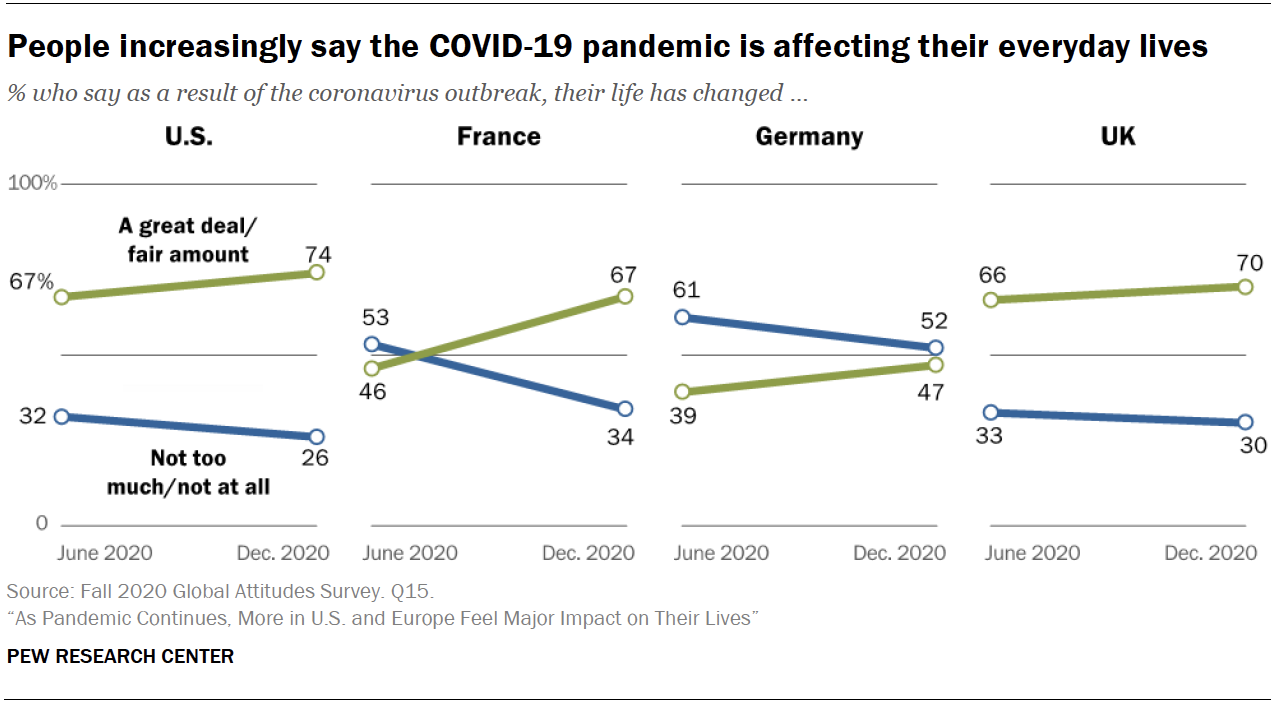
The novel coronavirus continues to pose weighty challenges for people around the world. Significant shares of the public in the United States, France, Germany and the United Kingdom say their lives have changed because of the outbreak, according to a new Pew Research Center survey conducted as vaccines were first being approved for conditional use in the UK and U.S. and restrictions tightened in parts of Europe. And the shares who feel this way have grown notably since summer, when the Center reported already-high levels of impact in people’s lives.
At the same time, as coronavirus case counts soar in each of these four nations, publics are largely split on whether their country has done a good job handling the outbreak. Ideology plays a role in people’s assessments of their national coronavirus response, but this rings especially true in the U.S. and UK, where those on the political left are more critical. Those who feel better about their nation’s economic situation are more likely to give positive reviews of how the virus has been handled thus far.
When looking toward the future, publics in each of the four countries share in the optimism that their nations are well-prepared should there be a future global public health crisis. Feelings of hope are especially strong among those who think their country is currently handling the coronavirus outbreak well, though the U.S. is an exception.
These are among the findings of a new Pew Research Center survey conducted from Nov. 10 to Dec. 23, 2020, among 4,069 adults in the U.S., Germany, France and the UK. The survey also finds that, prior to the coronavirus vaccine rollouts in each of the four nations surveyed, many in these countries did not support government-mandated vaccinations to stop the spread of COVID-19. This is especially true among those with lower levels of trust in their government.
Most say life changed due to coronavirus, a feeling that has increased since the summer
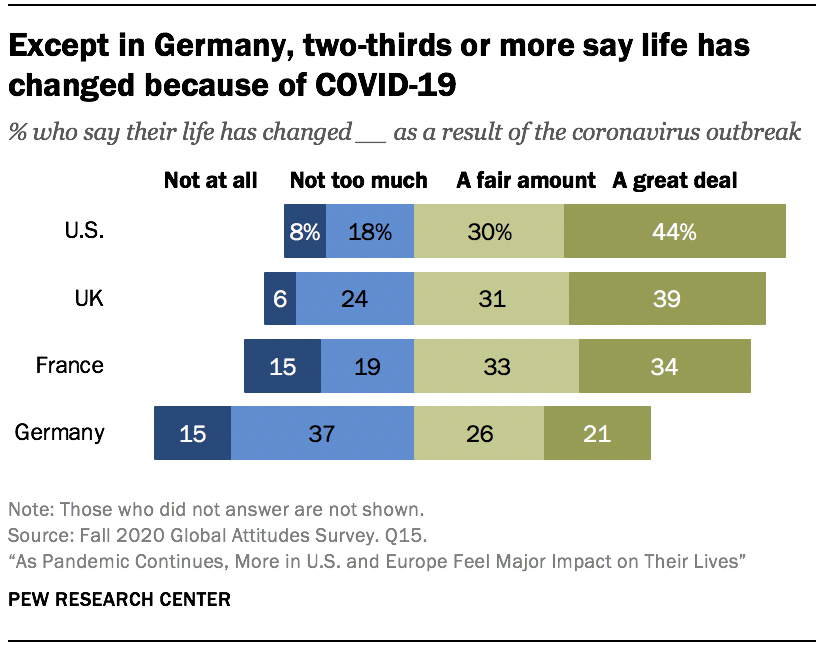
Of the four countries surveyed, majorities in three report their life has changed at least a fair amount due to the coronavirus. Nearly three-quarters of U.S. adults say their life has changed, including 44% who say it has changed a great deal. Across the Atlantic, no fewer than two-thirds of those in the UK and France also say their life has changed because of the outbreak.
Only in Germany do fewer than half of those surveyed say the coronavirus has changed their life, while 52% say their life has not changed much or not changed at all.
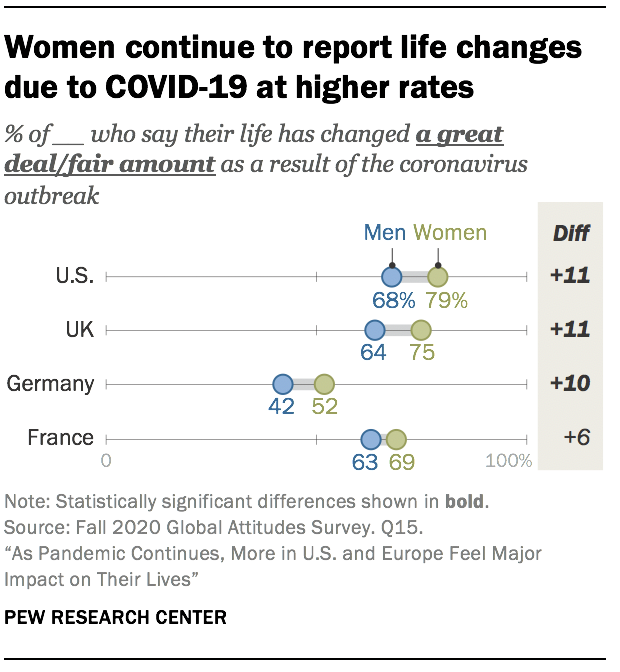
However, in three of four countries, women are significantly more likely than men to report their life having changed due to COVID-19. This divide reflects studies that have shown that women have lost jobs at a rate disproportionate to men, while also continuing a trend that Pew Research Center previously observed over the summer. The disparity is largest in the U.S., where 79% of women say their life has been affected, versus 68% of men – a difference of 11 percentage points.
Since the Center last fielded this question in summer 2020, a larger percentage of publics in the U.S., France and Germany have come to say their life has changed in some capacity because of the coronavirus outbreak. The largest increase was seen in France, where 67% now say their life has changed due to the coronavirus, an increase of 21 percentage points from June. Germany also saw an 8-point increase in those saying the pandemic has changed their life a great deal or fair amount.
Americans remain displeased with national response to combat COVID-19
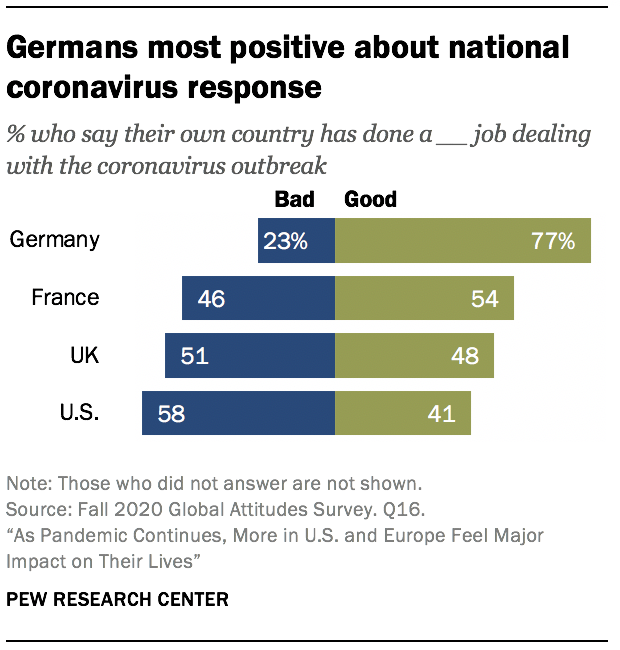
Across the four nations surveyed, responses to the pandemic garner varying levels of approval. In Germany, nearly eight-in-ten say their country has done a good job handling the coronavirus outbreak. In France, more voice support for the national COVID-19 response than do not (54% vs. 46%, respectively).
In the UK, opinion is split on whether their country is doing a good or bad job of dealing with the outbreak. And a 58% majority of Americans say the U.S. is doing a bad job of handling the pandemic.
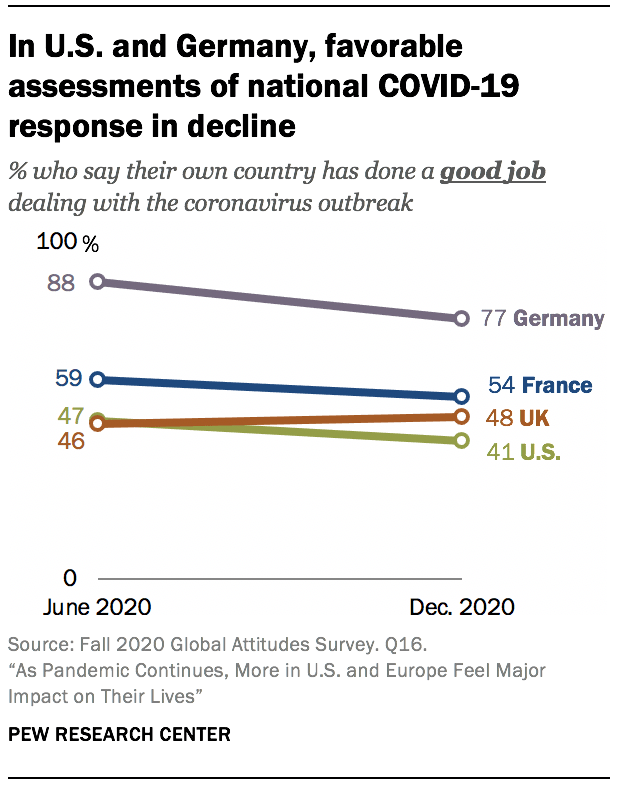
The U.S. and Germany show waning confidence in their countries’ handling of the pandemic. While 47% of Americans gave the U.S. response to COVID-19 a positive review over the summer, just 41% hold that opinion in the current survey, a 6 percentage point drop from June to November. Over the same period, the share of Germans who say their country has done well handling COVID-19 dropped 11 points. Unlike in the U.S., however, Germans remain overwhelmingly in approval. Opinions in the UK and France stayed relatively stable.
Ideological leanings play a role in how people assess their nation’s coronavirus response. In the U.S., 67% of those on the ideological right say the American handling of COVID-19 has been good, while just 13% on the ideological left say the same – a 54-point difference.
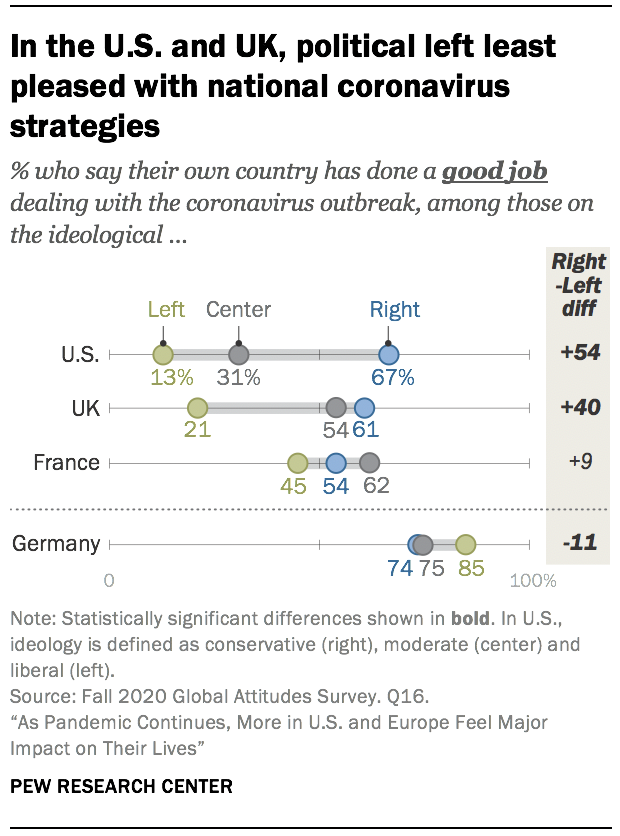
A similar split appears in the UK, which like the U.S. had a right-leaning party in charge of national executive power at the time of the survey. In Germany, those on the left hold more favorable views of their nation’s handling of the pandemic than those on the right, though nearly three-quarters or more still believe the response has been good, regardless of ideology.
Sentiment about the economy likewise relates to how people rate their national coronavirus response. In each of the four countries, those who think their current economic situation is good are significantly more likely than those who think the economy is bad to also believe their country is handling the outbreak well. In the U.S., for instance, while 60% of those who are positive about the economy say the American response to COVID-19 has been good, just 23% of those who think the economy is doing poorly share the same sentiment.
Most feel optimistic about future public health emergency strategies in their country
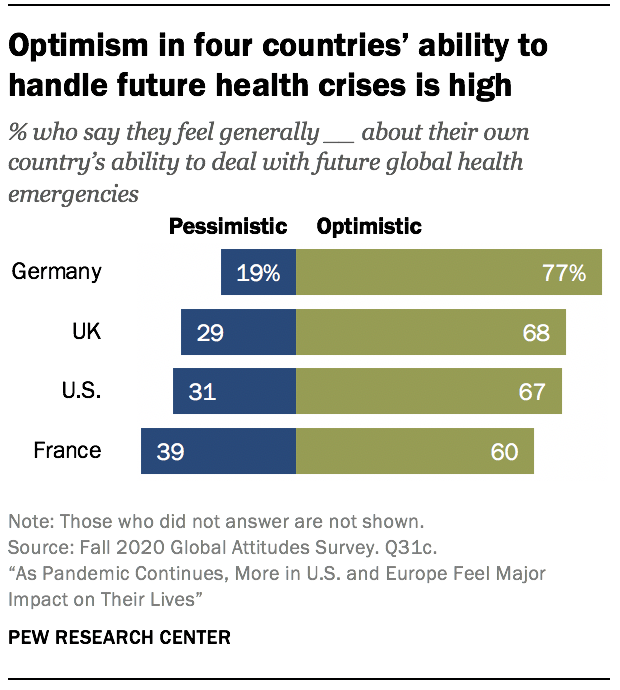
Although assessments of their country’s handling of COVID-19 vary, publics across the four nations appear hopeful about how their country would fare in future public health crises.
In Germany, about eight-in-ten say they feel generally optimistic about their country’s ability to deal with future global health emergencies. In the other three nations, at least six-in-ten hold the same opinion.
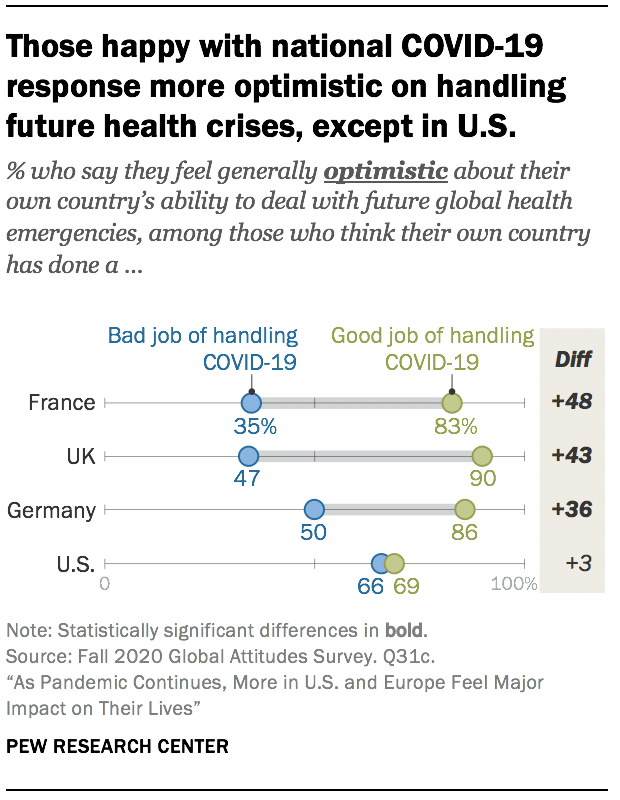
Optimism in three of the four countries relates to how people assess their nation’s handling of the coronavirus outbreak. For instance, 83% of French adults who think their country has done a good job in response to COVID-19 also voice optimism about France’s ability to deal with future global health emergencies. Just 35% who think France’s handling of the pandemic has been bad share this optimism for future situations, a 48-point difference.
This is not the case in the U.S., however, where nearly equal shares voice optimism regardless of what they think of the American response to the COVID-19 outbreak. And while Democrats (74%) are more likely to voice optimism for handling future health crises, a majority of Republicans (61%) also hold this view. (Republicans are also slightly less likely to answer this question.)
Few find it acceptable for governments to require coronavirus vaccine; UK the exception
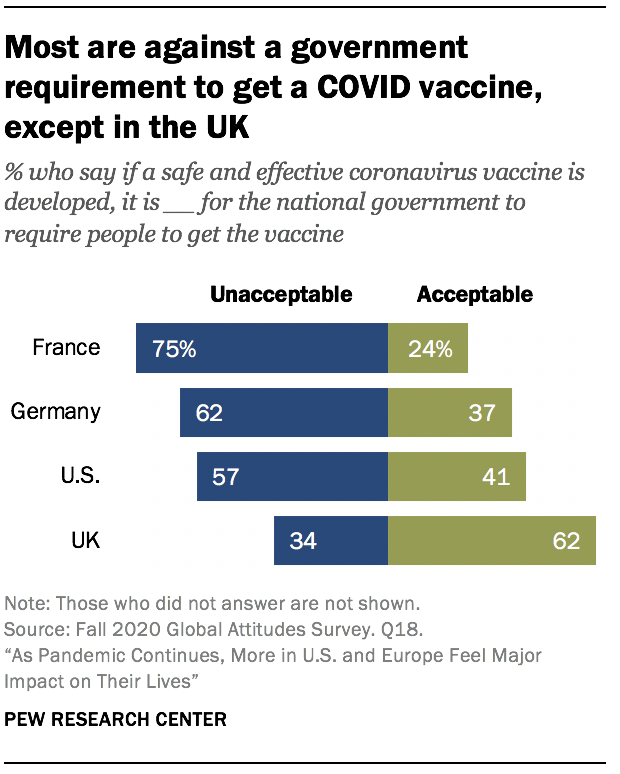
Previous Pew Research Center polling shows that domestically, six-in-ten Americans intend to get a coronavirus vaccine. But most in France strongly oppose the idea of requiring a coronavirus vaccine, and majorities in the U.S. and Germany share this sentiment.
For example, only 41% of those surveyed in the U.S. say that if a safe and effective coronavirus vaccine is developed, it is acceptable for the national government to require people to get said vaccine. Those in France are even less willing; a full three-quarters of the French say it is unacceptable for the national government to mandate coronavirus vaccination.

Britons, on the other hand, are more willing to allow the government to instate such a program, with 62% of those surveyed saying it is acceptable to mandate COVID-19 vaccinations. (Vaccines were at various stages of approval in these four countries during the survey period, but no government in these four countries currently plans to require mandatory vaccinations at the national level.)
Trust in national government is associated with more acceptance of a government-required COVID-19 vaccination program. In both Germany and the UK, there is a difference of 17 percentage points on the issue between those who do and do not trust the national government to do what is right for their country. The U.S. and France also exhibit a similar pattern. While only one-third of Americans who do not trust their government say it is acceptable to require vaccination, nearly half of Americans who do trust the national government say it is acceptable for the government to do so.
In the UK, France and Germany, views on nationally mandating the coronavirus vaccine do not vary across the political spectrum. In the U.S., however, large ideological differences arise. While 60% of liberals believe it acceptable for the national government to require Americans to get vaccinated, just 28% of conservatives share that opinion, a 32-point difference.




